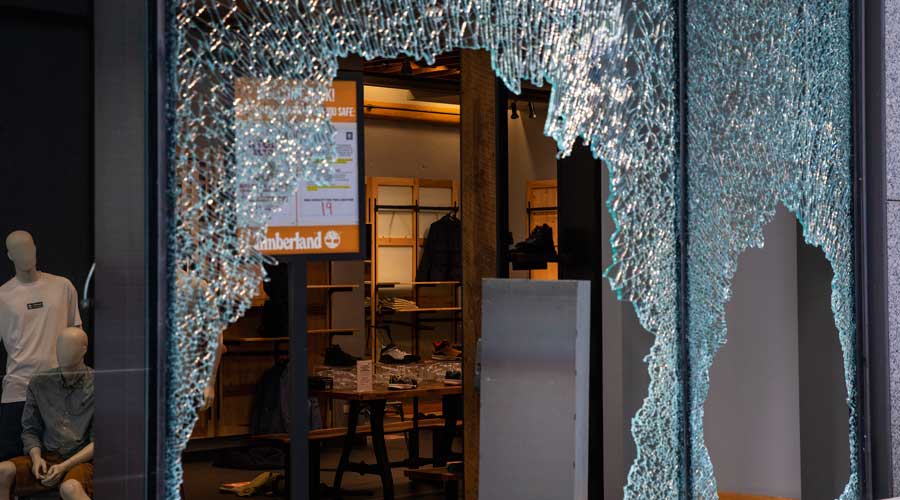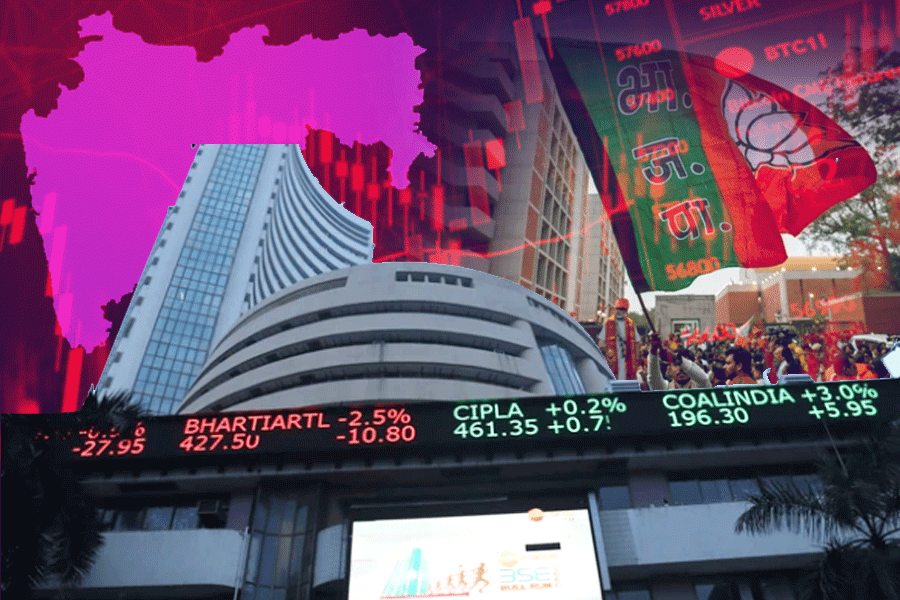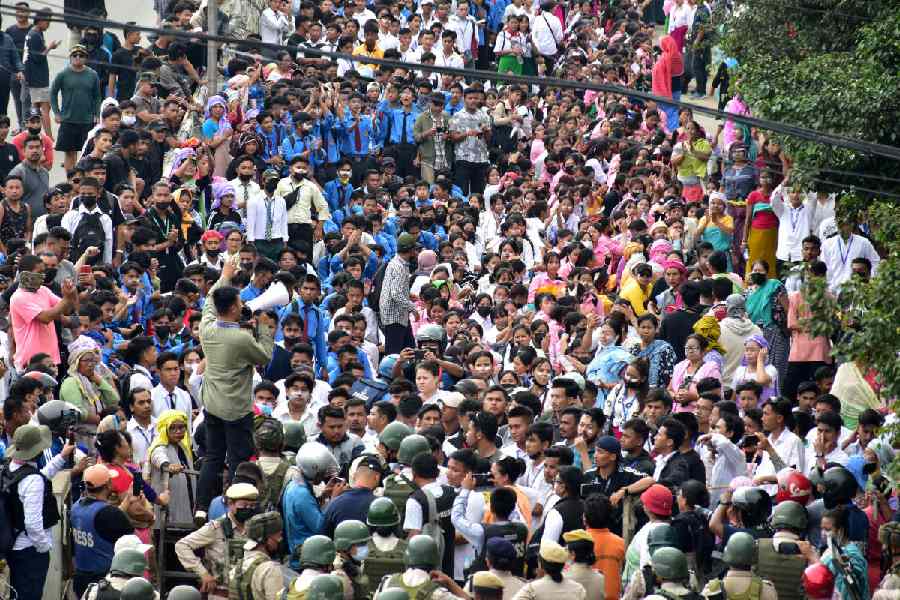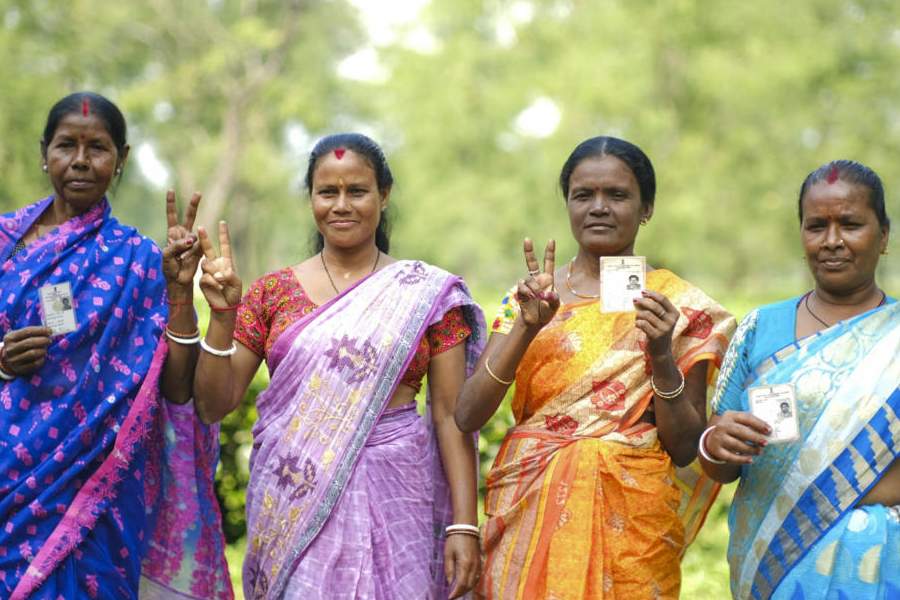Hundreds of people descended on downtown Chicago early Monday following a police shooting on the city's South Side, with vandals smashing the windows of dozens of businesses and making off with merchandise, cash machines and anything else they could carry, police said.
Hours earlier, on Sunday afternoon, police shot a man after he opened fire on officers — an incident that apparently prompted a social media post urging people to converge on the business district, Police Superintendent David Brown told a news conference.
Some 400 additional officers were dispatched to the area after the department spotted the post. Over several hours, police made more than 100 arrests and 13 officers were injured, including one who was struck in the head with a bottle, Brown said.
Brown dismissed any suggestion that the chaos was part of an organized protest of the shooting, calling it “pure criminality" that included occupants of a vehicle opening fire on police who were arresting a man they spotted carrying a cash register.
No officers were wounded by gunfire, but a security guard and a civilian were hospitalized in critical condition after being shot, and five guns were recovered, he said.
Mayor Lori Lightfoot agreed that the melee had nothing to do with a protest. “This was straight-up felony criminal conduct,” she said. “This was an assault on our city.”
The mayhem brightened the national spotlight that has been on Chicago for weeks after a surge in gun violence that resulted in more homicides in July than any month in decades. President Donald Trump, who has repeatedly criticized the city's handling of the violence, recently ordered more federal agents to Chicago to take part in what Attorney General William Barr called “classic crime fighting.”
Further ratcheting up the tensions in the city was a video circulating on Facebook that falsely claimed that Chicago police had shot and killed a 15-year-old boy. Posted at 6:30 p.m. Sunday, the video shows upset residents confronting officers near the scene where officers shot and wounded an adult suspect who they said had fired at them that day. By Monday morning, it had been watched nearly 100,000 times.
Witnesses to the unrest described a scene that bore a striking resemblance to the unrest that unfolded when protests over the death of George Floyd in Minneapolis devolved into chaos. Brown suggested that the lenient treatment of people arrested then played a role in what happened Monday.
“Not many of those cases were prosecuted to the full extent,” he said. “These looters, these thieves, these criminals being emboldened by (the lack of) consequences ... emboldened to do more.”
At the same news conference, Lightfoot addressed looters directly, telling them that police had collected a lot of surveillance video and other evidence that will be used to arrest and prosecute as many as possible.
“We saw you, and we will come after you,” she warned.
Cook County State's Attorney Kim Foxx disputed any suggestion that her office had shied away from prosecuting people who were arrested for ransacking businesses weeks ago. She said none of those cases had been dropped.
“That is simply not true,” she said. “Those cases are coming to court now.”
Videos of the vandalism showed huge crowds of people smashing their way into businesses and streaming out of the broken windows and doors with clothes and other merchandise. They loaded up vehicles, some moving slowly and deliberately, apparently not worried about being caught by police or being recorded by scores of cellphone cameras.
Vehicles drove away slowly, some leaving behind boxes of rocks that they had apparently brought to shatter the windows. Cash register drawers and clothes hangers were strewn about the streets, along with automatic teller machines that had been ripped from walls or pulled from inside businesses.
Stores miles from downtown were also ransacked, their parking lots littered with glass and boxes that once contained television sets and other electronics.
“This was obviously very orchestrated,” the Rev. Michael Pfleger, a prominent Roman Catholic priest and activist on the city’s South Side, told Chicago television station WBBM.
The havoc left downtown residents rattled.
“I’ve lived here for 20 years, and it’s getting scary, because you can’t walk out now," said Alan Freeman, who lives in the downtown area. “You don’t know if they’re going to start with the people walking on the streets, instead of the stores.”
Train and bus service into downtown was temporarily suspended. Bridges over the Chicago River were lifted, preventing travel to and from the downtown area, and state police blocked some expressway ramps into downtown. Access was to be restored later in the day.
Brown said the department would maintain a huge presence in the downtown area indefinitely, telling reporters that all days off had been canceled until further notice.
On the South Side, police responded about 2:30 p.m. Sunday to a call about a person with a gun in the Englewood neighborhood and tried to confront someone matching his description in an alley. He fled from officers on foot and shot at officers, police said.
Officers returned fire, wounding the man, who was taken to a hospital for treatment. He was expected to recover. Three officers also were taken to a hospital for observation, the statement said.
Brown later said the 20-year-old man had a long criminal history, including arrests for domestic battery and child endangerment, He said a gun was recovered at the scene.
More than an hour after the shooting, police and witnesses said a crowd faced off with officers after someone reportedly told people that police had shot and wounded a child. That crowd eventually dispersed.
But police later came across the social media post about a caravan of cars “being prompted to go to our downtown to loot,” Brown said. "Within 15 minutes, we respond and almost immediately the caravan is in our downtown area.”











